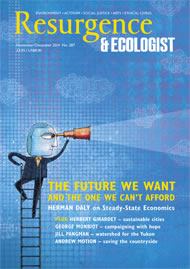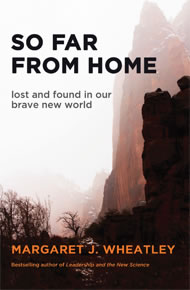“I wrote this book for you,” begins Meg Wheatley, but warns that it will not be an easy read. Here’s her uncompromising message:
“I no longer believe that we can save the world. Powerful, life-destroying dynamics have been set in motion that cannot be stopped. We’re on a disastrous course with each other and with the planet. We’ve lost track of our best human qualities and forgotten the real sources of satisfaction, meaning and joy.”
Is this a cry of nihilistic despair? And do you, dear Resurgence & Ecologist reader, perhaps find a resonance here? Many of us have been struggling since the sixties and seventies in our chosen fields to make big changes. Many of us have tried hard to ‘save the world’. Many of us are tired and demoralised and find it difficult to discern whether anything has changed for the better.
Yet Margaret Wheatley is not without hope. She says: “My intention is that we do our work with greater resolve and energy, with more delight and confidence, even as we understand that it won’t turn this world around. Our work is essential; we just have to hold it differently.” Listen to Václav Havel: “Hope is not the conviction that something will turn out well, but the certainty that something makes sense, regardless of how it turns out.”
Drawing on the Shambhala tradition, Wheatley talks about warriorship, about transforming ourselves from saviours to “warriors for the human spirit”. By opening to the world and seeing it as it is, by cultivating patience, compassion, discernment, effectiveness and courage, we may find, as the Tibetan Buddhist master Chögyam Trungpa expresses it, “that gentleness, decency and bravery are available – not only to us but to all human beings.” Focusing ourselves on the present, free of fear, we can say: “It doesn’t matter which way history moves. What matters is now.”
The book offers “a set of new maps”. The section ‘Home’ unfolds topographical maps, describing where we are; in ‘Lost’ we contemplate a set of systems maps, “charts of the prevailing currents that carried us here against our will”; and in ‘Found’ Wheatley gives directions to “the place of right work, free from hope and fear” where we reclaim our clarity and energy.
A refreshingly cool, systems-thinking-inspired analysis of where we are reminds us that the global culture is “an emergent phenomenon”, and that we are “bound to be defeated by emergence”. Wheatley is saddened to see so much of what she calls “absurd heroism”: “how many are still locked down by the belief that if they just work a little harder, if they just collaborate better or build a bigger network, if they just develop a new approach, they’ll turn the world around”, and she asks: “Can we please abandon these destructive beliefs?”
Do you find this discomforting? Yes, but it surely can also be energising to rid ourselves of some pious clichés. If we hear, “We need to accept responsibility that we created this,” or, “We created it, so we can change it,” let’s say, “No, we didn’t,” and, “No, we can’t.” By now, you will either be feeling much better, or you’ll be walking away.
If you stay with Wheatley, she’ll be a good companion. “Let us work together,” she says, “to embody the values that we treasure, and not worry about creating successful models that will transform other people”; let us learn to be “gentle, decent and brave as the dark ocean that has emerged continues to storm around us”.
Wheatley examines the nature of change and how we experience it as overwhelming, random and threatening; and she analyses how our brains – the ultimate in complex adaptive systems – have been hijacked in the service of corporate values, consumerist materialism and rampant individualism. Yet the nature of the universe is ‘entanglement’: relationship is all there is, and we manifest ourselves only in relationship; but how often do we email rather than call, engage with remote ‘friends’ rather than speak to our neighbours, lose the opportunity for intimacy that face-to-face encounters provide? If relationship is all there is, why are we running so fast in the opposite direction, firing off one-sided texts and tweets to our ‘followers’?
So are we really ‘Lost’? Our only option, says Wheatley, is to declare: “I’m not lost, I’m right here.” It looks pretty bleak when we encounter violence, despair, meaninglessness and greed. But, advises Wheatley, just sit with it, until you arrive at “the quiet place of accepting what is”.
Looking more deeply at where we are, she identifies the relentless “self making” nurtured by online activity and the endless distraction of our complex lives. We are “distracted beyond recall”. I remember, when I sat in one place to make a phone call, that because the phone was wired to the wall I just sat and spoke to the other person. Now whilst on the phone I can put the washing-up away, make a coffee, check my emails, walk to the shops… distracted. No wonder the phone has been described as an “interruption technology”. What suffers? Memory, concentration, pattern recognition, meaning making, and intimacy. It all sounds familiar. The complexity of modern life makes us “too tired to think”; but let’s move with Wheatley from outrage and despair to clarity.
Let’s call in the Shambhala warriors. Learning from this Buddhist tradition, and using the practice of mindfulness, we can find “gentleness, decency and bravery”. The warrior’s only true weapons are compassion and insight: compassion marked by real relationships and real conversations.







